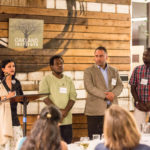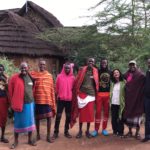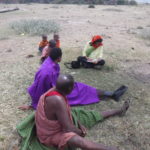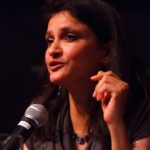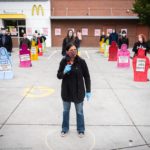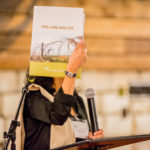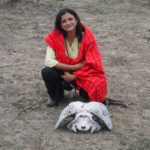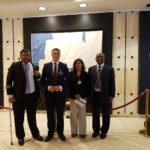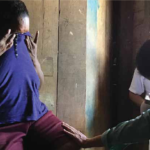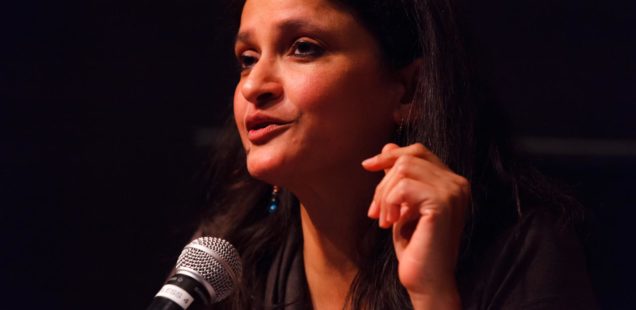
Anuradha Mittal: supporting the oppressed and exposing land grabbing with meticulous research, tenacious advocacy, and unflinching activism
For over three decades, Anuradha has been a powerful voice for those rendered voiceless by their own governments, relentlessly challenging failed development models and exposing corrupt governments and corporations. She has persistently advocated for meaningful systems change, uplifted impacted communities, and championed their dignity, lives, and livelihoods. Driven by a deep sense of justice and global solidarity, Anuradha started as a student activist in India, challenging the ‘development’ projects that displace and destroy lives with the fearlessness and rigor that were to become the foundation of her life’s work. After moving to the United States in the 1990s and working with the global civil society movement, she focused upon challenging the takeover of food systems by western industrial corporations through ‘a new green revolution’ in Africa and multilateral trade agreements. In 2004, she founded the Oakland Institute, designed to use rigorous research and advocacy to defend the human rights of the marginalized and advance social and environmental justice around the globe. Through her leadership, the organization has fought against land grabs in dozens of countries in all continents.
The Oakland Institute’s approach is uniquely distinct among Northern-based organizations. Anuradha insists that the Institute’s work begins only when a request is received from impacted communities to assist in their struggle and collaborate with them. Under Anuradha’s leadership, the Institute has exposed and halted numerous ‘investment’ deals that would have had devastating impacts on the basic human rights, livelihoods, and territories of indigenous peoples and rural communities. As powerful economic interests are driving dispossession of lives and the ecological degradation of the planet, Anuradha has been unafraid to challenge these interests and lead investigations that derailed land grabbing.
Among her successful outcomes is the case of Agrisol, an agro-industrial company from Iowa. Having secured the largest land deal in Tanzania, Agrisol would have displaced 162,000 villagers for an agro-fuel project. Anuradha’s investigative research and multi-year advocacy campaign resulted in the project being shelved and villagers keeping their land (see the Dan Rather program on this story, featuring Anuradha’s interview). Similarly, Anuradha’s research and activism around the largest land deal in South Sudan, halted plans by a US firm (headed by a former US diplomat) to steal one million hectares of land from villagers returning after the civil war. In another instance, she mobilized student groups and concerned citizens in the West to divest from investments resulting in landgrabs. Consequently, the Harvard University Endowment and Vanderbilt withdrew from the investment firm engaged in this land grabbing scheme.
Anuradha worked extensively in Ethiopia in service of indigenous groups in the Gambella and the Lower Omo regions. While the core of the Institute’s work is researching, reporting, and strategic campaigns, Anuradha deployed legal resources against the criminalization of land defenders. When Anuak leaders Okello Ochalla and Pastor Omot were jailed on false terrorism charges, she engaged lawyers in Ethiopia and the US and continued to fight for their freedom for over four years. She collaborated with the Ethiopian diaspora in the US to build pressure on the US Government. She helped to author the US Human Rights Resolution for Ethiopia and testified at the US Congressional hearings. The Resolution was passed in 2018 and Okello Ochalla and Pastor Omot were released after years of imprisonment. For her conviction to stay the course, she was called the “Voice of the Voiceless” in the Ethiopian diaspora.
In Sri Lanka, Anuradha has exposed the massive human rights violations and landgrabs faced by the Tamil minority in the first independent report— The Long Shadow of War— produced after the end of the civil war. Her field research was carried out in the heavily militarized Northern part of the country in 2014, just before the elections. Her continued advocacy has provided timely updates on the extent of land grabbing and the impact of militarization on the Tamil population up to the 46th session of the UNHRC in March 2021, where a resolution was adopted holding the government accountable for past and ongoing human rights abuses. This has enhanced the capacity of the Office of the High Commissioner to monitor violations of international law for future prosecutions.
In Nicaragua, Anuradha has been an unfailing friend of the indigenous communities in the Caribbean Coast Autonomous Regions, providing in depth information about the actors involved in grabbing their land— foreign gold mining firms, national and international actors in logging and cattle ranching industry, and prominent Nicaraguan officials. Official government documents obtained by the Oakland Institute revealed offer of millions of hectares of land for mining concessions and forestry projects. Anuradha’s research provided first-hand testimonies from members of communities who have been subjected to intense violence, including murders, kidnappings, burning of homes, and other intimidation, linked to land invasions. She revealed the complicity between Nicaraguan government officials and foreign companies as they dispossess indigenous communities instead of helping to gain full rights to their territories, in accordance with national laws and international legal judgements.
In Kenya and Tanzania, Anuradha has exposed the failure of “fortress” conservation and its devastating impact on the pastoralist communities. In Kenya, she brought light to the practices of the Northern Rangelands Trust (NRT), one of the country’s largest conservation organizations. Using the veneer of ‘community driven’ conservation, NRT has promoted the privatization of communal lands and disempowerment of traditional governance systems and livelihoods. NRT’S rangers are trained in weapons handling and combat operations and accorded the status of Kenya Police Reserve, which means they can carry firearms while on duty. Militarization of conservation in the region has resulted in gross human rights violations of the communities living in and around these conservancies. The Oakland Institute was one of the first to conduct extensive field research and challenge this model of privatized conservation, elevating the voices of the impacted communities.
As a result of her unwavering commitment to fight injustice, Anuradha has faced pressures, threats, and smear campaigns. For standing up against destructive development projects in Africa, she was accused of being anti-development. For calling out Israeli’s apartheid policies against the Palestinian peoples, she was labeled as “anti-Semite.” For her work to bring international pressure on the drivers of gold mining companies in the Northern Caribbean Coast of Nicaragua and exposing the incessant violence faced by the Indigenous and Afro-descendent communities, she was accused of being a CIA agent. For standing with the Maasai to fight against appropriation of their land for private safari operation, the Tanzanian government has marked her as “prohibited immigrant.” Anuradha has paid a high price for being a steadfast ally to communities facing destruction. But she remains resolute in defending human rights despite these attacks.
When asked how she measures success, Anuradha once said that “…the greatest markers of success are the ‘big wins’ – changes in legislation, the halting of detrimental land deals, the return of land, court victories, and so on. These outcomes, when they occur, have vast implications for communities on the ground. Most important, though, is our accountability and relationship with the impacted communities. Our ability to appropriately support local groups, elevate the voices of the impacted, and work in solidarity to advocate for change is the single most important measure of success for us.” Indeed, as lives are trampled upon by corrupt and abusive institutions, Anuradha Mittal is nothing less than an indomitable force for solidarity and justice.
Please find here https://www.oaklandinstitute.org/about/people/anuradha-mittal l many of the publications and reports by Anuradha.
Please also see: https://www.oaklandinstitute.

